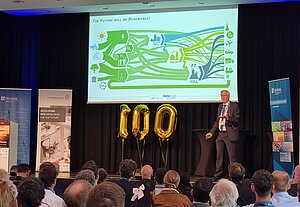The Fischer-Tropsch process, developed a century ago at the former Kaiser-Wilhelm-Institut für Kohlenforschung in Mülheim an der Ruhr, has developed into a key technology used worldwide. Today, it plays a central role in sustainable energy conversion and the production of green fuels.
To mark this special anniversary, an international conference was recently held in Mülheim, organised by DECHEMA, the MPI for Chemical Energy Conversion, the MPI für Kohlenforschung and the SynGas Conference. Over 200 participants from more than 30 countries came together to discuss the history, current developments and future of this ground-breaking technology.
A special focus of the event was on the further development of Fischer-Tropsch synthesis in the context of the energy transition, in which the MPI CEC in particular plays a decisive role. In his presentation, Institute Director Prof Walter Leitner emphasised the versatility of the process, which can now be used to produce synthetic fuels from renewable carbon sources such as CO₂ or biomass. ‘Fischer-Tropsch synthesis has great potential to help produce e-fuels that can be used in aviation or shipping, for example - areas that are difficult to electrify,’ explained Leitner. He emphasised that the process can make an important contribution to decarbonisation if the processes can be further optimised and implemented economically.
More on the history and future of Fischer-Tropsch synthesis and the conference in a press release from the MPI für Kohlenforschung.

